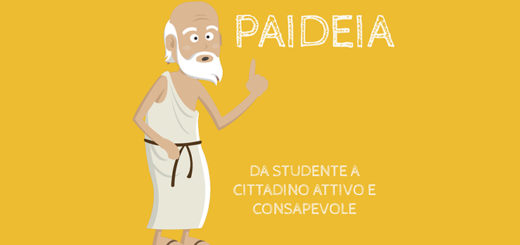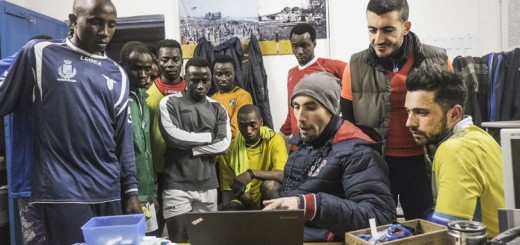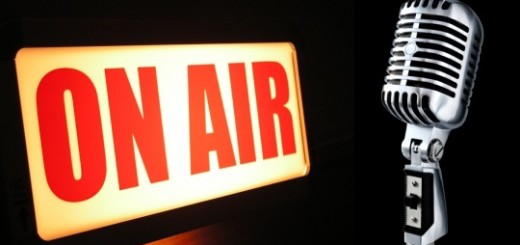The BAR Project: peddling towards integration
Born in 2016, Bicycles Against Racism tries to combat intolerance and racism through cycling. It promotes outings on the cycle paths of the Trentino region, where Italians and asylum seekers can ride side by side, making the most of their cultural differences.
Many years ago, Marco Pantani said that it is pointless having a super-light bike if your soul weighs a ton. He knew all about heavy souls which risk slowing down your legs. Thousands of times he “fell” but just as many times he got up again. The bike flying like a locomotive against hostile fate. Ready to climb the highest peaks of Europe that would take your breath away just to look at. Marco, The Pirate, was the proof that you can react against misfortune with great dignity. The exemplary metaphor for a sport, which like life, is firstly sacrifice.
Like the heroic cycling of Fausto Coppi and Gino Bartali which, according to Giancarlo Brocci, tested their physical limits. When thirst, tiredness and hunger are felt in all their intensity. The same condition that thousands of refugees have had to face in recent years before landing on the Italian coast. Who better than they to know what physical and moral limits are. How important it is to overcome them to reach that much-coveted happiness. The bike just like life. And from this parallel, in 2016, the BAR (Bicycles Against Racism) project was born.
From the will of a group of young people, fans of cycling, ready to take on prejudice and stereotypes.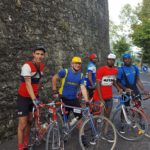 Confirming that there is no better ‘vehicle’ that a bicycle to help integration and, why not, to promote a healthy lifestyle which respects the environment. From the messenger women of the Second World War, passing through farmers to the workers who get to their work. The most popular means of transport has represented, from the outset, a symbol of liberty and social aggregation. Capable of reducing the distances, connecting worlds that otherwise would never have met.
Confirming that there is no better ‘vehicle’ that a bicycle to help integration and, why not, to promote a healthy lifestyle which respects the environment. From the messenger women of the Second World War, passing through farmers to the workers who get to their work. The most popular means of transport has represented, from the outset, a symbol of liberty and social aggregation. Capable of reducing the distances, connecting worlds that otherwise would never have met.
To listen to Tommaso speak, you would think he had a light soul. Like someone who is aware of the contribution he us making to make this world a better place. He chose to weigh himself down, though. He took responsibility, together with the UISP Trentino, Cinformi, Atas Onlus, ORA (Asylum Seekers Workshop) and the Cooperativa Sociale Kaleidoscopio, for the destinies of dozens of youngsters with a desperate need to feel part of something. To forget the sufferings endured, war and extreme poverty to try to reinvent for themselves a better future. A long way from all this.
To do this, they thought of using “simple” vintage bicycles. The same kind that Coppi and Bartali would have used at the beginning of the twentieth century, when they created a rivalry with a capital R. To pedal away, far from intolerance. Quickly overcoming differences, putting Italians and foreigners on the same road. Asylum seekers, in particular. And they succeeded perfectly. Their project is as simple as it is ambitious: using two wheels as a means of sensitisation and social inclusion, first and foremost.
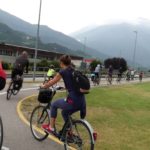 Three collective, or mixed, outings, as they were defined by Tommaso Iori, the president of the Trentino UISP, in which the local residents could meet asylum seekers and spend a day of sport together. The cycle paths of Trentino as a place of real togetherness to get to know one another, overcome differences and explore those enchanting valleys. 400km of uncontaminated nature and majestic mountains, from the Dolomites to Lake Garda. Following Tommaso’s example. Leaving Trento by bicycle and arriving in Rome to follow the first edition of the Anti-racist World Cup.
Three collective, or mixed, outings, as they were defined by Tommaso Iori, the president of the Trentino UISP, in which the local residents could meet asylum seekers and spend a day of sport together. The cycle paths of Trentino as a place of real togetherness to get to know one another, overcome differences and explore those enchanting valleys. 400km of uncontaminated nature and majestic mountains, from the Dolomites to Lake Garda. Following Tommaso’s example. Leaving Trento by bicycle and arriving in Rome to follow the first edition of the Anti-racist World Cup.
BAR, even if it seems impossible, is actually something more than all this. It contains a model of integration which uses sport to make dreams become reality. Thanks to the Officina Richiedenti asilo and Gira la ruota, who, among other things, supplied the bicycles, many of these youngsters have had to chance to learn a job. Removing and putting back wheels, straightening forks and changing brakes has become a job for some of them, as well as being an example to export to the whole country.
You just have to ask Mamadù to have this confirmed. When he arrived in Trentino from Guinea, he probably would never have thought that a bicycle would have been able to change his life for ever. Instead, that’s what happened. Just enough time to understand the difference between a handlebar gear change and one on the bike frame. Today he is working in a bicycle workshop and continues to “pedal” without pause towards a future that is waiting to be created. Hoping that one day he will be able to participate in a “real” race. In a time when peaceful coexistence seems more complicated than ever these two little workshops seems like places suspended in time. A genuine antidote to marginalisation and social exclusion.
The demonstration, a definitive one, that sport can overcome boundaries, scale walls and unite cultures and different religions. Thanks to a perfect synergy between social and sporting operators, as Tommaso Iori tells me. Nothing better than a nice spin on the bike, then, to transform differences into strengths. Trying to create an open and supportive society. Conscious finally that the crucible of races is a source of wealth and that only by knowing each other can we defeat violence and intolerance.
(Mattia Bagnato)

